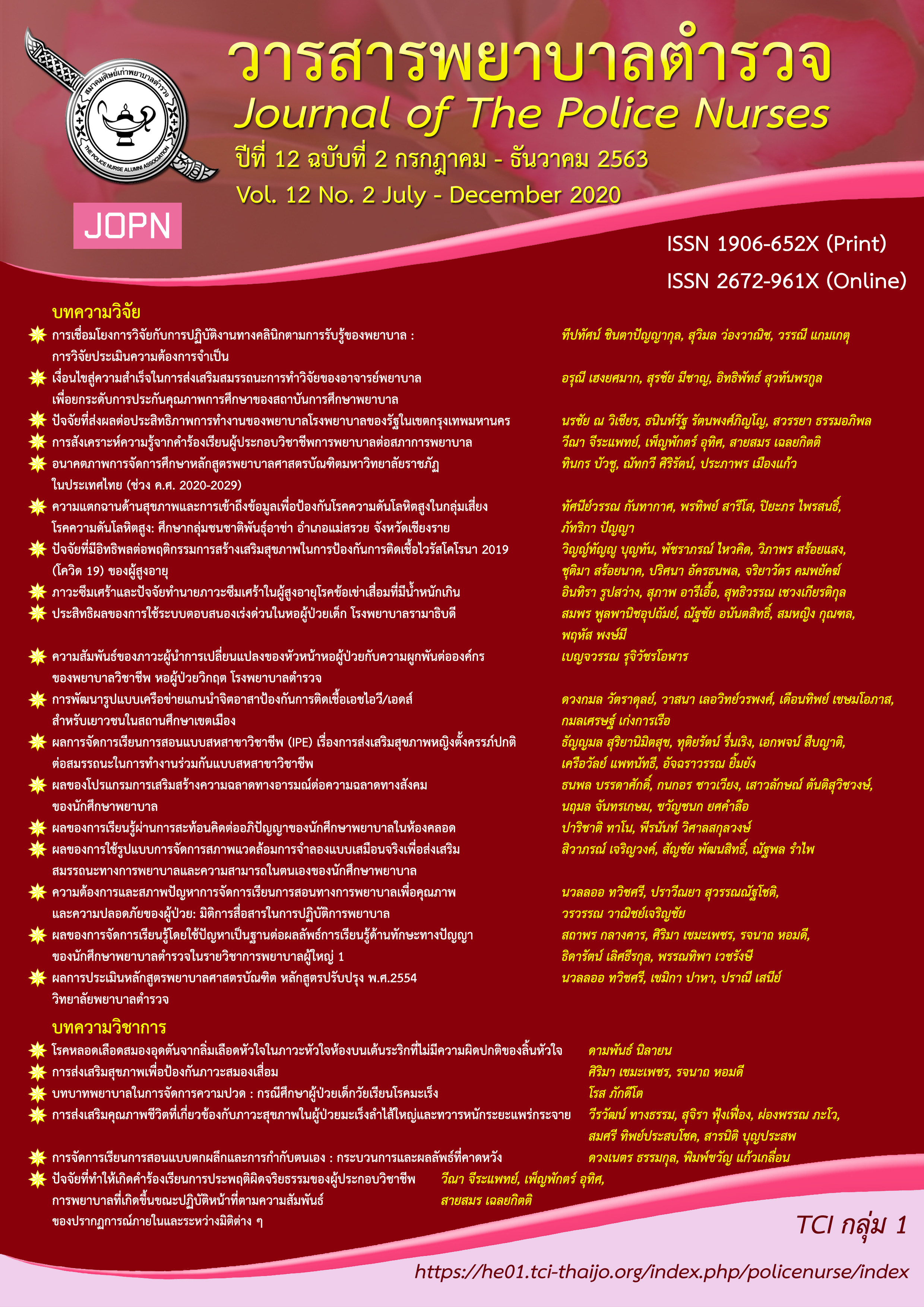THE EFFECT OF PROBLEM-BASED LEARNING MANAGEMENT ON INTELLECTUAL SKILLS LEARNING OUTCOMES OF POLICE NURSING STUDENTS IN ADULT NURSING 1 COURSE
Keywords:
problem-based learning, intellectual skills, nursing studentAbstract
This study was a quasi-experimental research. The objective of this research was to examine the effect of problem-based learning management on intellectual skill learning outcomes of police nursing students in adult nursing 1 course following the national qualifications’ framework for higher education. The samples were 66 police nursing students who studied adult nursing course 1 in the academic year 2018 at Police Nursing College. The instrument for the data collection was the intellectual skill learning outcomes consisted of 3 subjects. The content validity was approved by the experts. The index of item-objective congruence (IOC) of this instrument was .80-1.00 and the Cronbach's alpha coefficient for reliability testing was .83. Data analysis were used mean, standard deviation, and dependent t-tests.
The results of this study revealed that: the average intellectual skill learning outcomes of police nursing students after problem-based learning (PBL) was higher statistically and significantly than before the use of PBL (M=2.73, SD=.06; M=1.39, SD=.06; t=26.77, p=.00). When the output was separated into each dimension, it was found that the average ability to search data from various sources, then analyze and choose to use reliable references to improve knowledge and solve problems creatively for nursing students after using PBL was higher statistically and significantly than before the use of PBL (M=2.76, SD=.57; M=1.43, SD=.59; t=21.89, p=.00). The average ability for systematic thinking, creative thinking, critical thinking, and identification of the effect from the solution after the use of PBL was also statistically and significantly higher than before the use of PBL (M=2.71, SD=.55; M =1.36, SD=.51; t=27.01, p=.00). Finally, the average of the usage of scientific research processes and innovation in solving problems and studying health problems of nursing students was statistically and significantly higher than before the use of PBL (M=2.72, SD=.59; M=1.37, SD=.50; t=24.91, p=.00).
Downloads
References
Pimjaisai, J. (2010). The development of an instructional model based on constructivist theory to enhance learning abilities of nursing students (Doctor of philosophy). Department of Curriculum and Instruction Graduate School, Silpakorn University, Bangkok.
Police Nursing College. (2017). Program specification Bachelor of Nursing Science program B.E. 2018.
Puttiwanit, N., Puttiwanit, S., Suwanraj, M., & Kaewmahakam, O. (2017). Effect of problem-based learning on intellectual skills of nursing student in nursing of persons with health problems 1 Subject. Journal of The Southern College Network Journal of Nursing and Public Health, 4(1), 1-14.
Sinthuchai, S., Ubolwan, K., Bunsonti, N., & Rachawat, V. (2019). Effects of team-based learning on problem-solving ability and teamwork perceptions of nursing students. Journal of Nursing and Health Sciences, 13(3), 27-38.
Suknaisith, A. (2018). The results of problem-based learning in educational measurement and evaluation subject of Srinakharinwirot university’s undergraduate students. Interdisciplinary Sripatum Chonburi Journal (ISCJ), 4(2), 15-28.
Downloads
Published
How to Cite
Issue
Section
License
ผลงานที่ได้ตีพิมพ์แล้วจะเป็นลิขสิทธิ์ของวารสารพยาบาลตำรวจ















